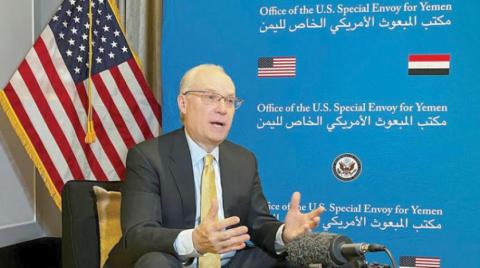
Some casual observers have been referring to the conflict in Yemen as the “forgotten war.” That has not exactly been the case. The United Nations, the Gulf Cooperation Council and the Saudi-led coalition have all made efforts to try to bring peace and prosperity to Yemen, going back as far as the tumult that led to the end of the three-decade presidency of the late Ali Abdullah Saleh in 2011.
More compelling is the argument that the war that began in the summer of 2014, and the humanitarian crisis that ensued in the country, needs to come to an end as soon as possible. By all measures, that is indeed the international consensus. In Stockholm last week, that consensus was translated into action.
In the eyes of some, the UN-brokered consultations in Sweden between representatives of the internationally-recognized government of Yemen and the Houthi rebels were perhaps a desperate measure to avert the continuation of a war that has brought tremendous suffering and destruction to Yemen. Somewhat surprisingly, at the end of the week-long discussions UN Special Envoy for Yemen Martin Griffiths was able to broker a cease-fire agreement regarding the vital port and city of Hodeidah. The agreement also calls on the two sides to redeploy their troops outside the city and establishes a committee that will oversee the withdrawal process. A monitoring mission is scheduled to arrive in Yemen as early as next week.
Although many close observers of the conflict — most importantly, the Yemenis themselves — are cautiously optimistic, the Houthis’ long record of reneging on agreements is a cause for concern. Nevertheless, this potential breakthrough might provide the Houthis with one more chance to demonstrate that, like all Yemenis, they too want to see this conflict come to an end. Considering that they did not show up to the previous talks, in Geneva, the Stockholm agreement could indeed prove to be a turning point.
In the eyes of some, the UN-brokered consultations in Sweden between representatives of the internationally-recognized government of Yemen and the Houthi rebels were perhaps a desperate measure to avert the continuation of a war that has brought tremendous suffering and destruction to Yemen.
Fahad Nazer
The conflict in Yemen, like all conflicts around the world, is a complicated one. One could argue that unresolved political disputes and long-simmering economic challenges help explain Yemen’s unfortunate legacy of political turmoil. However — and although it is hard to imagine now — in 2013, Yemen was portrayed by some as a model to emulate of a country that had peacefully negotiated its way out of the tumult ushered in by the so-called Arab Spring. An inclusive National Dialogue and a GCC initiative created the framework for a peaceful transition.
However, the Houthis — no doubt emboldened by their Iranian patrons — reneged on previous agreements and convinced themselves that they have a right to impose their will on the Yemeni people and usurp power by force.
Their violent campaign, which took them from their northernmost base of Sadaa all the way down to the southernmost tip of Aden, has brought unimaginable pain, destruction and misery to the beleaguered but proud people of Yemen. However, the talks last week offer the Houthis a chance to make changes.
With the sole exception of the Iranian regime’s leadership, the entire international community wants this terrible conflict to come to an end. Tehran clearly does not care about the pain and suffering of the Yemeni people. If it did, it would not have encouraged the Houthis to continue fighting by supplying them with weapons and technology. Iran has done nothing to alleviate the suffering of the Yemeni people nor has it contributed in any way to the reconstruction efforts that have already begun in certain regions. As it has done in Syria, Lebanon and Iraq, Iran’s main objective is to sow division and discord.
Nevertheless, the entire international community has expressed its support for the preliminary agreements that were reached last week about Hodeidah and Taiz. That includes Saudi Arabia, which expressed its strong support for the agreement and its “commitment to reach a political solution in Yemen.”
Granted, the language of the agreement was relatively vague and many of the details, such as who will collect customs revenues in Hodeidah, will need to be agreed upon at a later date. However, the talks do set the stage for broader discussions early next year. Considering how long peace talks have been stalled, Sweden represents a major step in the right direction.
Fahad Nazer is a political consultant to the Embassy of Saudi Arabia in Washington and an international fellow at the National Council on US-Arab Relations. He does not represent or speak on behalf of either organization. Twitter: @fanazer
Disclaimer: Views expressed by writers in this section are their own and do not necessarily reflect Arab News" point-of-view











